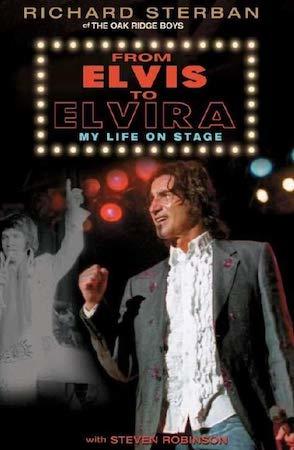Section Branding
Header Content
Watch: 'Giddy up' with the Oak Ridge Boys at this year's Georgia Mountain Fair
Primary Content
The annual Georgia Mountain Fair is known for bringing big names in music to North Georgia, drawing crowds from several states. This year's fair runs from Aug. 16 to Aug. 24 and the Oak Ridge Boys, Grammy winners and members of the Country Music Hall of Fame and the Gospel Music Hall of Fame, return to the Anderson Music Hall in Hiawassee, Ga. on Aug. 23.
The group has sold more than 41 million records in the course of its six-decade career and routinely performs up to 100 or more shows per year. Before the Oaks’ famous mustached tenor Joe Bonsall died in July after a long illness, he and members Duane Allen, William Lee Golden and Richard Sterban, now in their 80s, released the album Front Porch Singin', with Grammy-winning super producer from Georgia, Dave Cobb, at the helm. The quartet is now in the midst of a farewell tour with 28-year-old singer Ben James taking over Bonsall's role.
GPB caught up with legendary bass vocalist Sterban about his love for Southern music, his stint as a background singer for Elvis Presley, his 52-year career with the Oak Ridge Boys and the enduring popularity of their 1981 hit “Elvira,” which PBS described as a “fun and frivolous” song that stays “lodged in people’s brains” forever.
TRANSCRIPT:
Kristi York Wooten: Nice to see you, Richard. I want to start with the back story here: You are a guy from New Jersey who ended up doing Southern gospel and country music and having huge worldwide hits with the Oak Ridge Boys. Give us a little bit about your personal background and how you found this music.
Richard Sterban: Well, first of all, as a young guy going to college in Trenton, N.J., I organized my own group with a bunch of — three other guys that were located in Bristol, Pa., which is right across the Delaware River. We organized our group, and since three of the guys were from Pennsylvania, the Keystone State, we called our group the Keystone Quartet. And J.D. Sumner had this group called JD Summer and the Stamps Quartet [which sang and recorded with Elvis Presley]. And he offered me a job. He was actually in the Guinness Book of World Records as the world's lowest bass singer, if you can believe that. And he wanted to hire a younger bass singer to take his place. So they hired me, and it involved me having to move to Nashville. So that's how I got to Nashville.
Kristi York Wooten: Before you joined the Oak Ridge Boys, you sang on one of Elvis's most famous songs. You also sang spirituals and gospel music with him.
Richard Sterban: Yeah, I would say the biggest song that most people would recognize that I sang with Elvis was a song called “Burning Love.” [Sings “Hunka Hunka Burning Love”…] And I sang on that record. And, you know, you were talking about how Elvis loved gospel music. That was very, very true.

I have some great memories of the times I spent with Elvis, and most of my memories, or at least a lot of my memories, involve singing gospel music when we were on tour. He would like to try to find a piano somewhere, and he would expect all of the group to get around the piano and harmonize, sing gospel quartet songs wherever we went, and he loved spirituals as well. And so we sang a lot of spirituals, and it really was a special time. I have a lot of great memories of the times I spend with others singing gospel music.
… So here I was, you know, apparently on top of the world singing with the King of Rock and Roll, [Elvis Presley]. But I had to make a decision: What do I do? And I had to admit, at the same time, I was a big fan of the Oak Ridge Boys. I loved the music that they were making, and I wanted to be a part of that group. I felt, like I said, they had a great deal of potential. And so I made the decision back in 1972 to leave Elvis and join the Oak Ridge Boys. And, you know, a lot of people questioned that decision. “How could you do that? How could you leave Elvis and join the Oak Ridge boys?” But I really believe that I was doing the right thing. I followed my heart. 52 years later, I look back. I think I made a pretty good decision back then, you know.
Kristi York Wooten: Take us back to 1981. “Elvira” was on all the radios that summer. I remember just you could not get away from that song. And of course, being somebody from the South, everybody just loved the style of it. I know it was a cover song that just kind of jelled for you all and put you at the top and these crossover hits really expanded your audience. But tell me about “Elvira” and “Bobbie Sue.” Those had been recorded before, right? So how did you pick those?
Richard Sterban: Well, “Elvira” was actually written by a gentleman named Dallas Frazier. I remember one day we were in Ron Chancey’s office. Ron Chancey was our producer. He produced most of the No. 1 hit records on the Oak Ridge Boys. And I remember sitting in his office and he played Dallas Frazier's version of “Elvira” for us. And we all sat up and like, “Wow, I think maybe this is the song we had been looking for.” It was the first time I'd ever heard it. Some of the other guys, like, heard the song before. They were familiar with it, but we shot up and listened to this and we went, “Wow, I think this is going to be special.” Just a few days later, we went into the recording studio and we recorded the song and it was Ron Chancey’s idea for Joe [Bonsall, tenor], to sing the lead vocal, and he does such an unbelievable job on that. But it was also his idea for me to do the “Giddy up, oom papa mow mow” part. So what I did, I just took that line and kind of adapted it to my way of doing things, and I guess it turned out okay, you know, because it is probably one of the most well-known basslines, you know, in all the music business. And it's our signature song. It really is.
And you can count on the fact when we come your way, you are going to hear that song, you're going to hear me do “Giddy up, oom papa mow mow.” That will definitely happen, yes.
This interview was edited for length and clarity.


